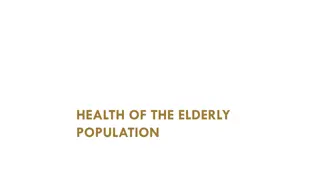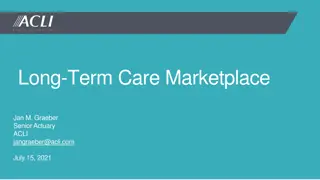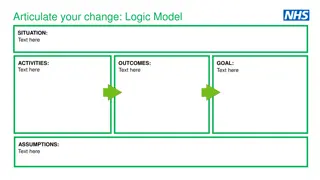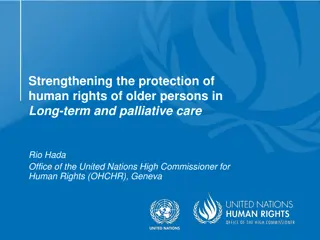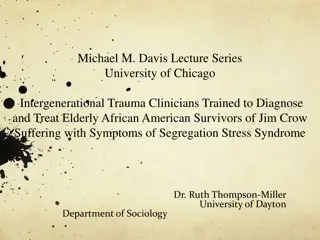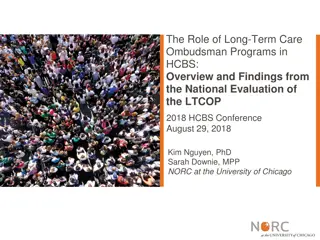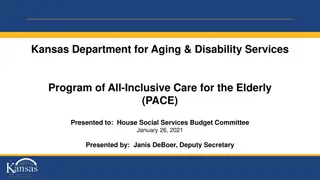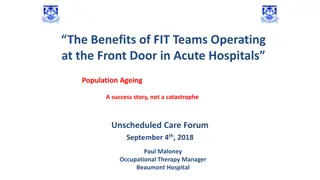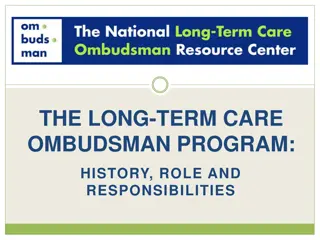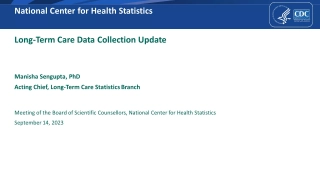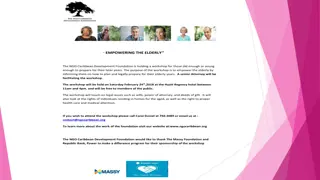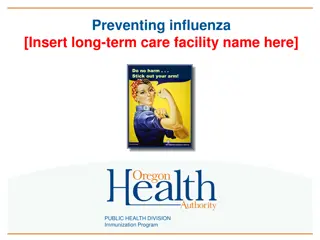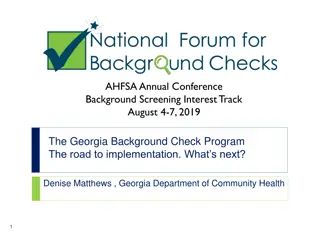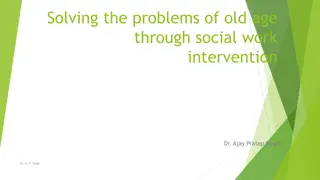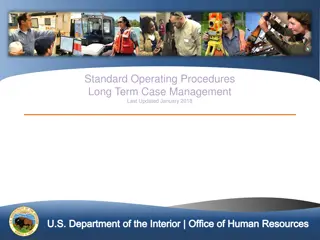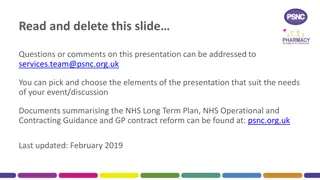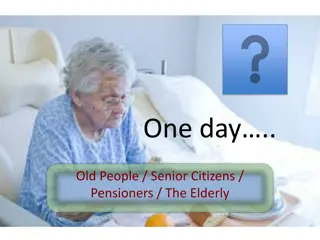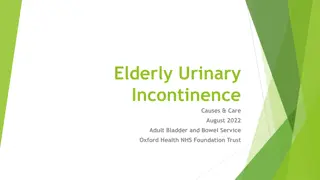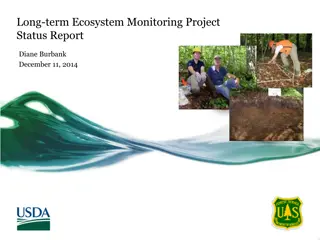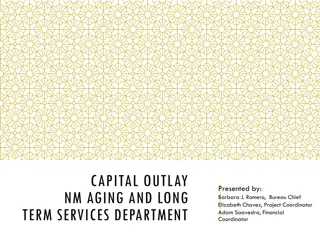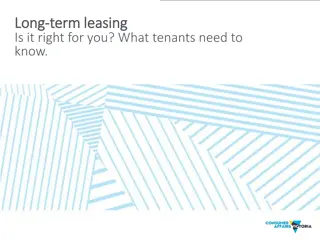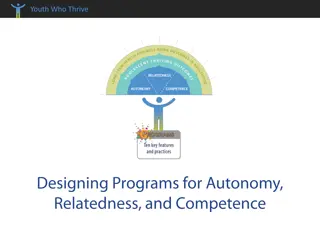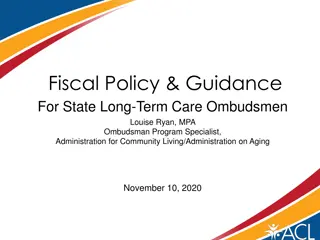Long-Term Care Programs and Care Management for Elderly Individuals
Long-Term Care Programs like the Program of All-Inclusive Care for the Elderly (PACE) focus on providing comprehensive care for seniors through a multidisciplinary team including social workers, registered nurses, nurse practitioners, physicians, and other professionals. The roles involve regular assessments, member-centered planning, and addressing crisis situations and risks related to physical, cognitive, environmental, social, and economic factors. When risks are identified, a thorough review of the care plan and services is conducted to ensure the well-being and safety of the members.
Download Presentation

Please find below an Image/Link to download the presentation.
The content on the website is provided AS IS for your information and personal use only. It may not be sold, licensed, or shared on other websites without obtaining consent from the author. Download presentation by click this link. If you encounter any issues during the download, it is possible that the publisher has removed the file from their server.
E N D
Presentation Transcript
Long term Care Programs Program of All Inclusive Care for the Elderly (PACE) Social Worker Registered Nurse Nurse Practitioner / Physician Team Supervisor Other Disciplines Family Care Program Care Manager Registered Nurse Team Supervisor Family Care Partnership Care Manager Registered Nurse Nurse Practitioner Team Supervisor
CM and RN Roles Contract Requirements Minimum of monthly phone contact and quarterly face to face visits Semi Annual Assessment Semi Annual Member Centered Plan Change of Condition Assessments and Member Centered Plan as indicated Ongoing Evaluation and Effectiveness Outcomes Supporting Long Term Care Outcome Fostering Independence Meeting Member Needs Anticipating Risk Ensuring member health and safety
Signs of Crisis / Risk Physical / Cognitive Conditions Unstable or change in medical condition New diagnosis or progression of existing condition impacting mental capacity Physical dependency for basic needs Multiple hospitalizations / ER visits Overuse of 911 system Lack or loss of supports Inability to self manage medical conditions Unexplainable injuries
Signs of Crisis / Risk Environmental Unstable housing Unstable family or support system within the home Unsafe physical environment Structural Crime/safety concerns Poor accessibility in the home --Bug infestation --Waste /mold --Hoarding Lack of in-home resources Food Utilities
Signs of Crisis / Risk Social /Economic Factors Financial exploitation Inability to self-advocate and make fully informed decisions d/t questionable mental and/or cognitive capacity Mismanagement of money / Lack of resources to support basic needs Communication barriers Isolation Inadequate or questionable support system
When Risk is Identified Review current MCP and Services Complete change of condition assessments and MCP Explore the need for: Behavior Support Plan, Behavior Intervention Plan, Restrictive Measures, Rights Limitations, Crisis Plan (chapter 34) Member education r/t risk and decision making Risk agreement worksheet POA Designation Consultations (internal and external) Document, Document, Document!
Community Care Internal Process: This is a fluid process dependent on the individual circumstances The first step is always to talk with your supervisor The following resources are available and should be involved as appropriate Employment Specialist Medicare Resource Team Quality Department Provider Management / Provider Quality Dementia Care Specialist Member Rights Specialist Manager Regional Director BH Specialist Restrictive Measures Lead Rehab Specialist Clinical Services At a minimum the Site Manager must be involved prior to an APS/EA referral being made.
I-Care Internal Process: This is a fluid process dependent on the individual circumstances The first step is to talk with your team supervisor The team supervisor will consult with FCP leadership as indicated which includes: Clinical Practice Manger/Program Manager/QAPI (Quality nurse) The following resources are available and should be involved as appropriate Compliance Officer Lead Restrictive Measure Family Care Partnership Director Specialty Team (AODA, Mental Health) Dementia Specialist Community Resource Specialist SDS/Employment Specialist Provider Quality Committee General Counsel Member Rights Specialist Team Supervisor will consult with FCP leadership prior to contact with APS
My Choice Family Care Internal Process: This is a fluid process dependent on the individual circumstances. First step is always to consult with your Lead Supervisor. If further consultation/direction is needed, the Best Practice Team offers specialists in the following areas: - Behavioral Health - Dementia - Restrictive Measures - AODA - Nursing Additional resources within the MCO: - Dietician - Provider Quality Department (Residential Placement, Provider Support --Member Rights Specialist At a minimum the Lead Supervisor must be involved prior to an APS/EA referral being made. - Mental Health - Clinical Risk Manager - SDS and SHC - Employment - Medicare Consultant
Examples of External Consultations External Staffing (i.e. hospital, SNF, other Provider staff) Specialists: AODA, CSP, etc. Medical Providers Milwaukee County Behavioral Health Crisis Entities Neighborhood Services, Health Department Fire Department, Police Department Community Paramedic Program Social Security: financial risk or exploitation Engage Informal Supports: Family, Friends, Church, Neighbors
External Consultations and Member Confidentiality External consultations can be vital to identifying and managing risk HOWEVER Anytime you share Member information or Protected Health Information (PHI) that is spoken, written or electronic, you become involved with some facet of privacy and security regulations Statute allows for MCO to share information with EA/APS Wis. Stats. 46.22, 46.90 and 55.01. This means that you are able to share information with APS in regards to a member situation without a release. Sharing detailed information timely is critical in helping to insure member health and safety of members. When consulting with anyone else outside of your organization, be sure either authorization is not required, (OR) authorization has been received If unsure, contact your supervisor or Privacy Officer.
Possible Interventions Be creative and find solutions to fit each unique situation Rep Payee SHC / Personal Care- Home Health Care Services Residential Placement Medication Management Meal Services: Food Pantry, HDM, Congregate Meal Sites Adult Day Services MH Therapy Training for Unpaid Caregivers Assistance with appointments: VPA, Transportation, Caregiver Call Police for Wellness Check Psychological/Competency Evaluation (talk with your Supervisor prior to pursuing this option Care conference including family and/or other Providers
Consult and Collaboration with APS Talk with your Supervisor to ensure all interventions/resources have been exhausted If APS/EA involvement is likely, follow your internal MCO process Be prepared to provide information: Nature of the situation (historical patterns and current information) What services and supports have been offered and tried or refused Concerns about the condition of the home (guns, dangerous animals, other) Statute allows for MCO to share verbal / written information with EA/APS Collaborate on problem solving solutions and interventions Joint home visits IDT be willing to testify in court if needed
MCO Limitations Inability to gather information from third parties without member consent Lack of ability to remove an individual from their environment unwillingly Lack of ability to force an individual to accept services Lack of ability to limit money/resources and socialization for a competent individual Member s Right to refuse third party assistance (i.e. Care Team, Police, Medical Providers) Third party cooperation / response People have the right to make bad decisions (Dignity of Risk) Guardianships Filing for Protective Placement (chapter 55)
A Few Reminders Consult with your supervisor Know your member - Gather as much information as possible i.e. supports, family, emergency contact information, life history etc.. Don t let the situation get out of control Consult early Monitor the plan, effectiveness of services, cost share Anticipate, intervene early, take notice of the situations If something doesn t seem right Ask questions


